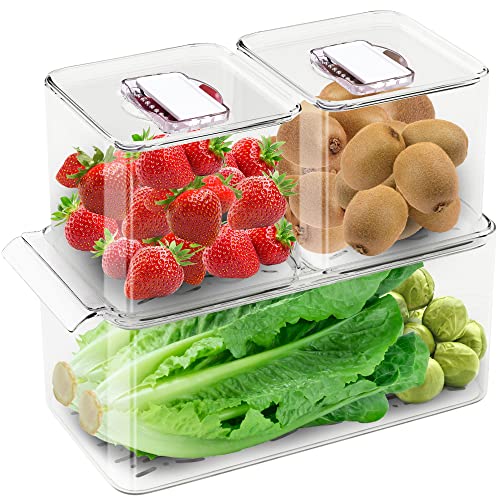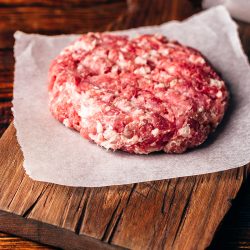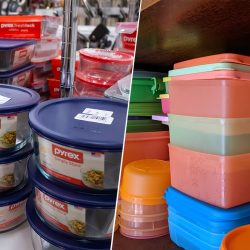We all love delicious cheese, but what's the best way to wrap it? Foil or cling wrap? We've looked about to found out the expert advice on proper storage of your favorite cheese. This way, you won't have to worry about blue gone bad or gouda gone ghoulish. Let's see what we found out.
If you're choosing between cling wrap and aluminum foil, the better choice is the foil. Cling wrap will lock in moisture that could cause your cheese to mold or get soggy. The foil will keep it dry.
We'll look at the specifics of this more in-depth below. We'll also discuss the best thing to wrap cheese in, how long cheese will keep in the fridge, how you can keep a block of cheese from molding (and does foil help prevent this)? We'll also look to see if it's okay to store cheese in Tupperware or Ziploc baggies. So please, keep reading.

Should You Wrap Cheese In Foil Or Cling Film?
When it comes to cheese, you want to say no to plastic. Even if your cheese comes wrapped in plastic, it's a good idea to substitute with foil or wax paper. Plastic wraps or coverings keep the cheese from breathing. This can lead to moisture and bacteria buildup in your cheese.
Plastic wraps can also compromise the protective rind that many kinds of cheese are made with. It can also alter the flavor and texture over time.
Aluminum Foil Is A Great Choice For Cheese

Foil is a good choice for wrapping your cheese, particularly hard cheeses. It will not hold in moisture but will keep your cheese from drying out. This will help keep your cheese edible for a good long stretch if properly stored in your fridge.
Is foil the only choice for wrapping cheese, though? Are there other things that make great cheese wrappers? Let's take a look.
What Is The Best Thing To Wrap Cheese In?
Besides aluminum foil, wax paper and cheese paper are the best choices for cheese. Like foil, they allow your cheese room to breathe and won't dry out. Wax paper is perfect for soft cheeses like Brie and camembert.
Wax paper bags like these are made specifically for storing cheese and can be used several times. If you love cheese, these are a great addition to your storage supply drawer in your kitchen.
Click here for this on Amazon.
For something totally adorable for picnics or to-go charcuterie assortments, check out this decorative cheese paper. Dotted with goats, sheep, and cows, along with some of your favorite cheeses, these sheets are perfect for keeping your cheese at optimum edibility.
Click here for this on Amazon.
How Long Does Cheese Last In The Fridge?
The biggest issue as cheese ages is mold. Which begs the question, how long can you store cheese in the fridge before it starts to mold? The first trick, of course, is to practice proper storage techniques.
Once you have it properly stored, hard cheeses like parmesan and cheddar can be stored for six to eight weeks after they've been opened. If they are still unopened, you can store them for as long as two to four months without mold settling in.
Softer cheeses, like brie or camembert that have more natural moisture, will ruin in about two to three weeks in the fridge after they're opened. Good thing they're so delicious you won't want them to sit around for that long.
How Do You Keep A Block Of Cheese From Molding?

The key to keeping that cheese from molding is proper storage? But what is proper storage? As we discussed, you don't want to place your cheese in any plastic film that holds moisture in. Moisture leads to the risk of mold blooming on the surface of your cheese.
Wrap your cheese in wax paper, then place it in a glass or plastic container inside your fridge. This will keep moisture off the surface of the cheese but will also keep the cheese from drying out completely. If you do get a little mold on the surface of your cheese, cut it away before eating.
Does Wrapping Cheese In Foil Prevent Mold?
Unfortunately, there is nothing on the market that actually prevents mold. Because cheese is a natural material and something we are apt to touch without hands, bacteria will grow on its surface. So total prevention is not likely if your cheese is going to hang around for a while.
You can slow down mold growth by practicing smart wrapping techniques, as we've discussed. And, of course, the best prevention of mold is eating your cheese quickly. Which seems like a great idea to us because who doesn't love gobbling down some delicious cheese?
Should I Put Cheese In Tupperware?
An extra layer of protection is not a bad thing when it comes to cheese. Particularly stinky cheese. You can wrap your cheese in waxed paper or foil, then place it into a Tupperware. Some foodies suggest poking holes in the Tupperware, though, to allow the cheese to breathe.
There are also specialty cheese storage vaults available that help provide airflow along with storage. These cheese vaults are versatile and work with all different types of cheese. Plus, they look awesome, too.
Click here for this personal cheese vault on Amazon.
Can Cheese Be Stored In Ziploc Bags?
Just like with Tupperware, you can store your cheese in Ziploc bags. However, wrap it up in wax paper or cheese paper first. Then either leave your Ziploc a little unsealed or poke a few holes in it. This will allow the cheese to continue to breathe in the fridge while giving it an extra layer of protection and cutting down on the smell.
What's The Best Place To Store Your Cheese In The Fridge?
The best place to store your cheese in the fridge is the produce drawer or other drawer designated for cheeses and cold cuts. These drawers stay slightly warmer than the rest of your fridge, which will keep your cheese from drying out too quickly. It will also allow it to ripen to a full gorgeous flavor.
But did you know there is such a thing as an actual cheese fridge? Many home cheesemakers have discovered they can take a kitchen wine fridge and use it to cure and ripen homemade cheeses. It's also a great place to keep your cheese population if you're a major cheese lover.
You can buy these individual bins for your fridge to store cheese in, as well as produce. Click here for these on Amazon.
Do All Cheeses Have To Be Refrigerated?
Generally, hard cheeses such as cheddar and both block and grated Parmesan do not require refrigeration for safety. They will last quite a bit longer if kept refrigerated, though. Your softer cheeses definitely need to be refrigerated and can only stay out at room temperature for about three hours before they need to be discarded. So don't pull out the cream cheese unless you plan on using it all up.
Can You Freeze Cheese?
Freezing cheese is not often recommended. It can ruin both the texture and the flavor that makes cheese so delicious. Ricotta, cream cheese, and cottage cheese do not do well frozen at all, but you might be able to get away with freezing some harder cheeses if you aren't going to eat them in a timely fashion.
Just know the flavor and texture may change some.
Eat Your Cheese Quickly And Then Storage Won't Be An Issue At All

Okay, we confess. Maybe we don't understand the issue of cheese storage because we love it to gobble it down and not leave it hanging around for very long. But if you do need to store your cheese, remember don't use tight plastic wrap. But do use wax paper or aluminum foil.
You can even slide it into a 2nd container to help cut down on fridge odors and keep your cheese from drying out too quickly before you have a chance to use it.
If you enjoyed this post here at KitchenSeer.com, please check out a few of our others below:
How to Remove Food Smells And Stains From Plastic Containers?
Are Ziploc Bags Airtight? [And How To Make Them So]





![Glass and plastic Tupperware containers, How To Clean Tupperware Oil Containers [6 Helpful Cleaning Solutions]](https://kitchenseer.com/wp-content/uploads/2022/06/Glass-and-plastic-tupperware-containers-250x250.jpg)

![Aging old cheese in the factory, Does Cheese Always Age Well Or Does It Go Bad Eventually? [According To Type Of Cheese]](https://kitchenseer.com/wp-content/uploads/2021/09/Aging-old-cheese-in-the-factory-250x250.jpg)

![set of cheese knives on a round wooden board. 14 Types Of Cheese Knives [Inc. What Cheese They're Good For And Why]](https://kitchenseer.com/wp-content/uploads/2021/07/set-of-cheese-knives-on-a-round-wooden-board.-14-Types-Of-Cheese-Knives-Inc.-What-Cheese-Theyre-Good-For-And-Why-250x250.png)
